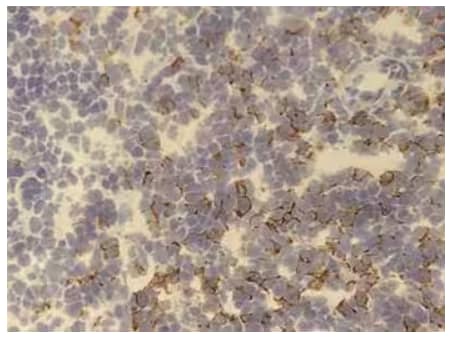What is CD8?
The T-cell co-receptor CD8 is a cell-surface glycoprotein that bridges the lipid bilayer by interacting externally with ligands, such as major histocompatibility complex (MHC) class I, as well as internally with signaling molecules such as tyrosine kinase p56 lck. CD8 associates with lck through a zinc clasp structure and down-regulates major Th2-type cytokine production. It is expressed on thymocyte subsets and cytotoxic T-cells and exists as either as a disulfide-linked homodimer or as a heterodimer of CD8 alpha and CD8 beta. CD8 plays an important role in T-cell development in the thymus and T-cell activation in the periphery.

Immunohistochemical analysis showing expression of CD8 alpha in mouse spleen tissue using Rat Anti-Mouse CD8 Monoclonal Antibody (53-6.7) [NBP1-49045].
CD8 alpha Antibody in Research Studies
Early studies with the CD8 alpha antibody from Cambridge established different types of tolerance (reversible versus permanent) induced in peripheral T-cells in response to a wide range of antigens1. Related tolerance studies from the same group relied upon the CD8 alpha antibody to demonstrate that a transplantation tolerance can be established using a simple, non-toxic anti-CD4 and anti-CD8 monoclonal antibody therapy2. Additional CD4 and CD8 studies out of Takahashi’s lab employed the CD8 alpha antibody to map signaling molecules involved in mediating interleukin 2 (IL-2) downstream effects in T-cells3. Bankoti et al examined the effects of dioxin (TCDD) using the CD8 alpha antibody immunoblotting, which allowed them to monitor dendritic cell (DC) homeostasis and identify a splenic DC subpopulation highly responsive to dioxin4. CD8 alpha antibody immunohistochemistry allowed bioengineers at Taiwan’s National Tsing Hua University to assess immune responses occurring during femoral bone defect healing5. These researchers found that baculovirus-engineered adipose-derived stem cells stimulated bone morphogenic protein 2 (BMP2), resulting in low immune response levels and enabled defect healing.
Bio-Techne offers CD8 alpha reagents for your research needs including:
- CD8 alpha antibodies
- CD8 alpha antibody pairs
- CD8 alpha lysates
- CD8 alpha peptides and proteins
- CD8 alpha RNAi
PMIDs
- 1702726
- 1980112
- 1608966
- 20211938
- 22796166